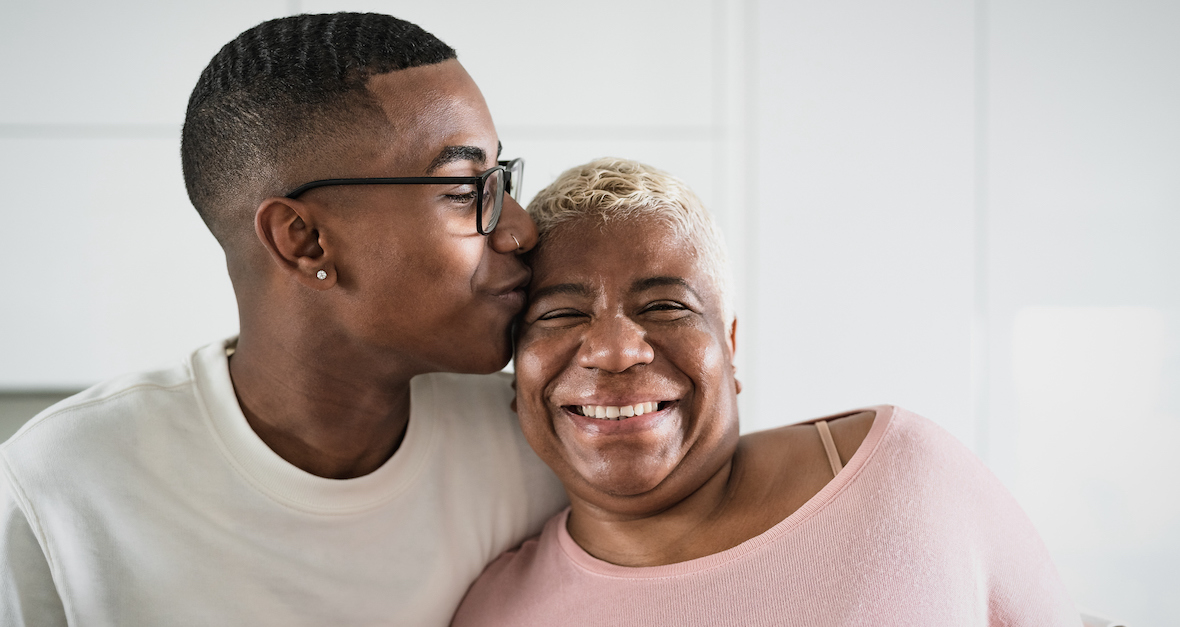Ways to Show Your Young Adult Love
Love can be touchy, literally, when you're a parent trying to love a young adult. They don't have the adorable soft cheeks they used to, and many have achieved a stature above your own. While parents want to lean in and hug and go back to the years when it was easy to do so, young adults may feel smothered. Or just not up for the amount of love we want to give.
I've noticed that as my teens are getting taller and older, and developing patterns and preferences of their own, changing my approach to love them like I want to be loved is how I can grow with them.
How some young adults receive love is different than how we did when we were their age. We didn't have people trying to show us love apart from our parents on something called the Internet or a cell phone. Chances are you often received love from your friend's parents when you were at their house or your neighbors across the street who'd talk with you each time they passed you in the neighborhood. You may have even heard or experienced more love from these adults than your own parents.
Parents and grandparents are learning how to show love to young adults today when some of the norms from their youth are so different today or even non-existent.
How Do We Love Young Adults in Ways That They Respond?
Not long ago, I drove with my oldest teen to do some shopping. I already knew that she didn't love shopping. So as we talked about the occasion for which we were buying a dress, I let her know that I never had an occasion to buy a dress for the same reason we were shopping for her.
I explained how I saw her outwardly and inwardly and asked if she saw herself that way too. I shared how strong I think she is, her high standards and values, and that others probably perceive what she stands for, and it may be what they'd like to stand for as well. It was one of those moments that I felt like, as a parent, I could show love for my young adult by affirming her character. It wasn't the questions she expected me to ask, but the ones she didn't that drew us closer.
I still get the hugs and squishy love you want out of your children when they're growing up. But it's less physical and more emotionally connecting.
Sometimes young adults need space rather than smothering. This is really hard for some of us (wink!) because we just want to grab them and hug them until they hug us back. Or until we feel like we have had enough "loves" as I have called it in our household.
But sometimes, the best way I can love one of my children is to let them have some space where they don't sense that I'm trying to grab hold of time and them at the same time. We all know that when we want our young adults to spend time with us, it can feel like it's a job or a chore for them when all we want is a little affection or time or both!
In looking at what some other moms do and sprinkling in a few ideas, I've come up with seven ways that you can show love to your young adults.

Photo credit: ©GettyImages/Alessandro Biascioli
You Could:
-Set a timer for 15-30 minutes after they come home from school, an activity, or work so that you can allow them a chance to decompress, and then you both know that your time together will not be forced (or rushed).
-Have a weekly night that you know you can do something that brings you together, whether it's critiquing a movie, working on a project together, or playing a game as a family.
-Check cell phones at the counter after they come home or after you come home and focus on each other rather than who may be trying to reach you both.
-Establish how your young adult likes to receive love from you. Ask, "Is it okay for me to hug you, or would you rather I express my love in other ways"? I've asked one of my teens this, and the main thing they said to me is that I can hug but not too much.
-Learn the unexpected ways that speak to your young adult. Notice if they appreciate the coffee you brought them, if they liked the dinner you made that you hadn't made in a while, or if you bought their favorite shampoo. Hey, we all have to be clean! Little things you do can go a long way toward showing that you notice them and their likes. Sometimes the little things can make a difference in a day going south (for both of you).
-Plan the best time to ask your son or daughter to do something you need them to do. A repair, a chore, or something you expect them to do. Asking at the wrong time can communicate that's what you care about most rather than how they are just coming in from school, a job, or a sport that is already demanding.
-Use words that communicate your love so that your child hears it frequently and genuinely. When you try too hard or use words and expressions that are, as my kids have called it, "cringy," you get some stares or create a situation that feels awkward.
When I asked my young adults how they know I love them, one replied: "Knowing I'm loved is enough because you tell me often. And if you see that I'm tired, even if you want to show me your love, I appreciate it when you give me my time alone to rest before wanting to come into my room to talk with me."
Another way my teens said they feel loved is when I interact with them, not just on how they are doing at school but talking about things beyond school, sports, or social settings. Also, giving them space to process difficult decisions and not making decisions for them shows that I'm letting them discover what works and doesn't work for them. They like to learn from their own lives, not ours.
Psychologist John Coffey and his colleagues surveyed over 150 teens and their parents. Maryam Abdullah notes in her article that "teens tended to feel more loved on days when their parents showed more warmth, and they tended to feel less loved on days when there was more conflict with their parents. The interesting finding? On days when parents were warmer, the conflict between them didn't matter as much to how loved teens felt. In other words, being warm and affectionate toward teens seemed to protect against the cost of conflict."
According to Coffey and his colleagues, "these findings are important because emotional experiences can influence adolescents' coping skills and behavior in ways that affect their well-being in the long-term."
We know showing love to young adults is important. But how important is it that we are not more concerned over a conflict but instead look at how we can love through our tone and actions? Of course, we want to show our youth not just how to go through conflict but grow through it. But it's clear that when we express our love, it doesn't wipe away conflict, but it can certainly help protect your relationship so that your young adult can receive not only correction but the love you want to give them as well.
Photo credit: ©GettyImages/Galina Zhigalova
Originally published October 04, 2023.






